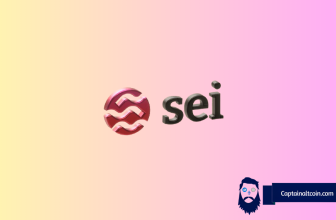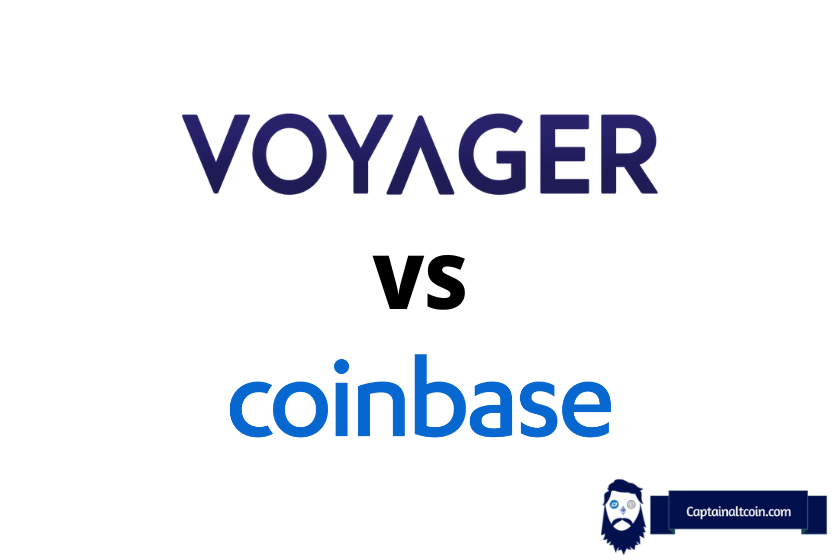
Although both offer close to the same number of coins, and a similar trading experience, these two exchanges have subtle differences that set them apart. Voyager is currently only available in the United States, so those from other countries have to consider Coinbase for the time being, however, those from the US would find Voyager more appealing due to its lower fees.
What you'll learn 👉
Background
Voyager

Voyager was founded by wall street and silicon valley entrepreneurs in order to create a flexible, secure and transparent platform for crypto trading[1]. They differ from Coinbase in the sense that unlike traditional exchanges, Voyager connects users to over a dozen exchanges to offer the best prices and liquidity available[2].
Coinbase
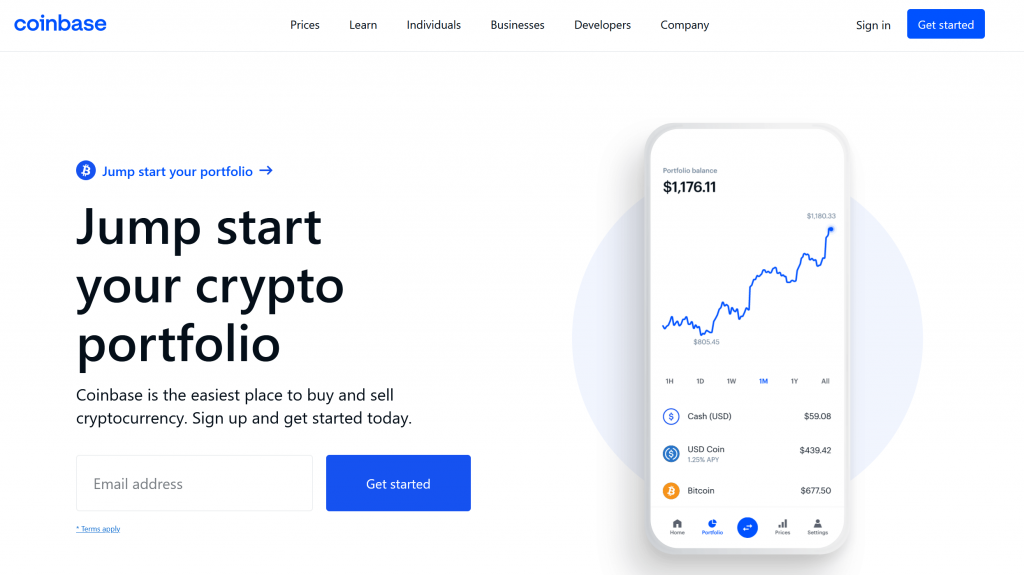
Coinbase started in 2012 and over the years has grown its userbase to around 56,000,000 users across the world, who traded on average $335,000,000,000 in volume in a single quarter alone[3]. Being a beginner-friendly exchange, it attracts a lot of newcomers who often take their first crypto steps on the platform.
Trading experience
Voyager
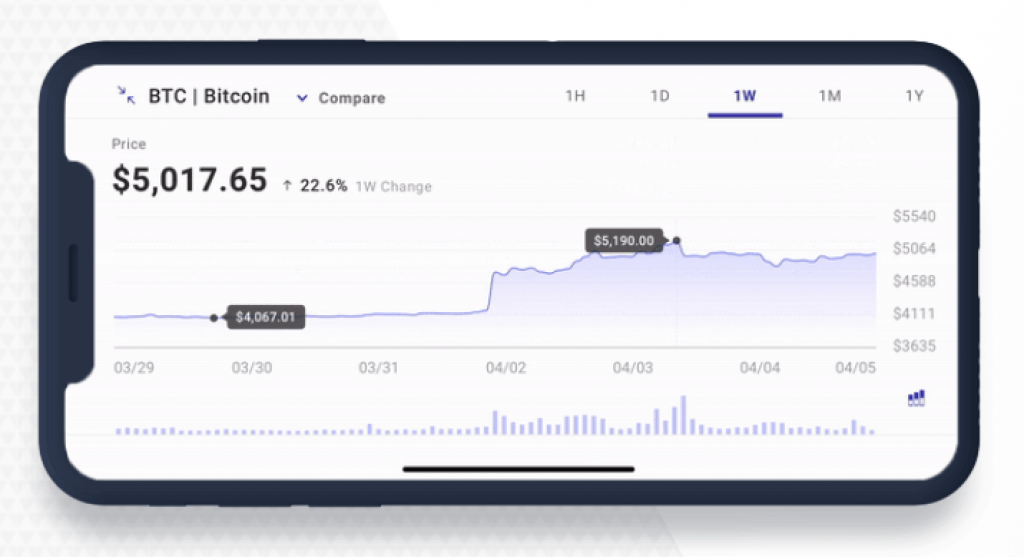
The trading experience on the Voyager app is rather simple, it is easy to navigate through and nothing seems out of place. The portfolio is easy to access and read, so investments – profits and losses – are easy to keep track off. The app uses what Voyager refers to as “Smart Order Routing”, a system that connects to various exchanges to make the best trades possible[2].
The Voyager app is available on both IOS and Android.
Please note that recent reviews left on these app stores have expressed dissatisfaction concerning bank transfer times and crypto deposit errors.
Coinbase
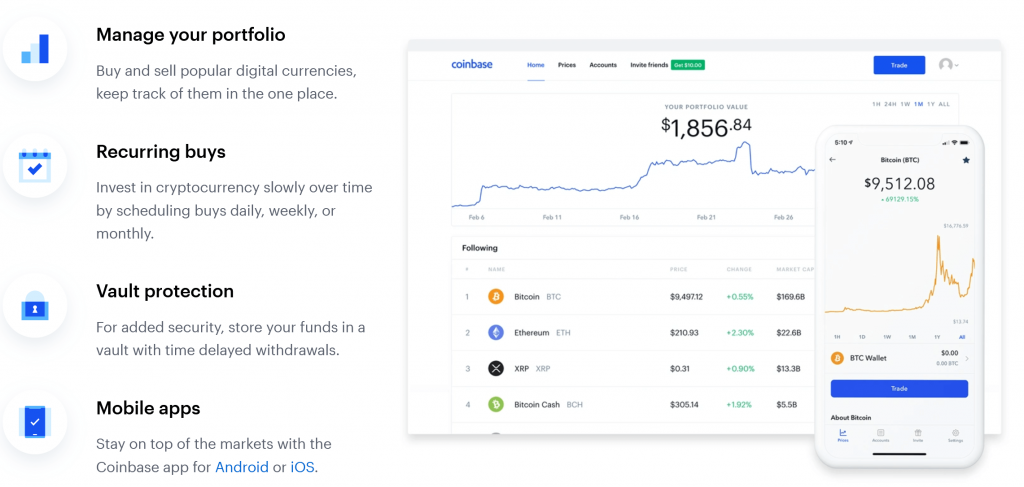
Coinbase is geared towards beginners and prepares them for the world of trading crypto with spot trading. On Coinbase, users can buy, sell, hold, transfer and exchange crypto using the in-built Coinbase wallets. Facilitating this process is a simple, user-friendly UI that serves to help users navigate the platform with ease, view their portfolio, keep track of favorite coins, and more.
Coinbase can be accessed through its website, or through its IOS and Android apps.
Available coins and contracts
Voyager
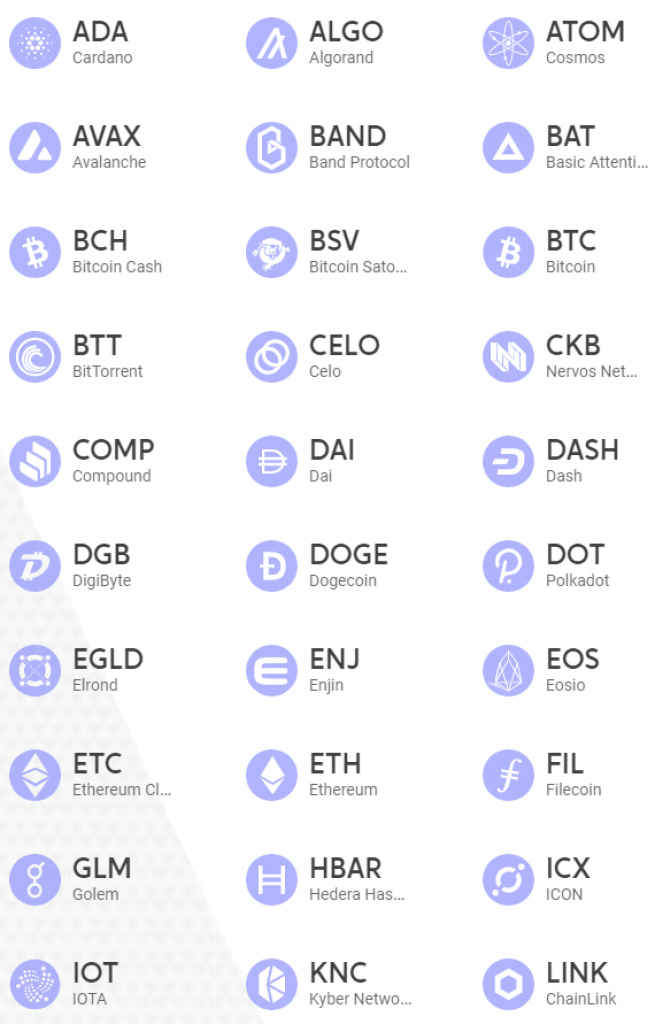
Available coins: Currently there are 57 coins supported on Voyager, including Bitcoin, Ethereum, Litecoin, Doge, Algorand, Cardano and more.[4]
Available contracts: At the moment users can only buy spots, i.e., they can only buy, hold and sell the available coins with their accounts.[2]
Coinbase
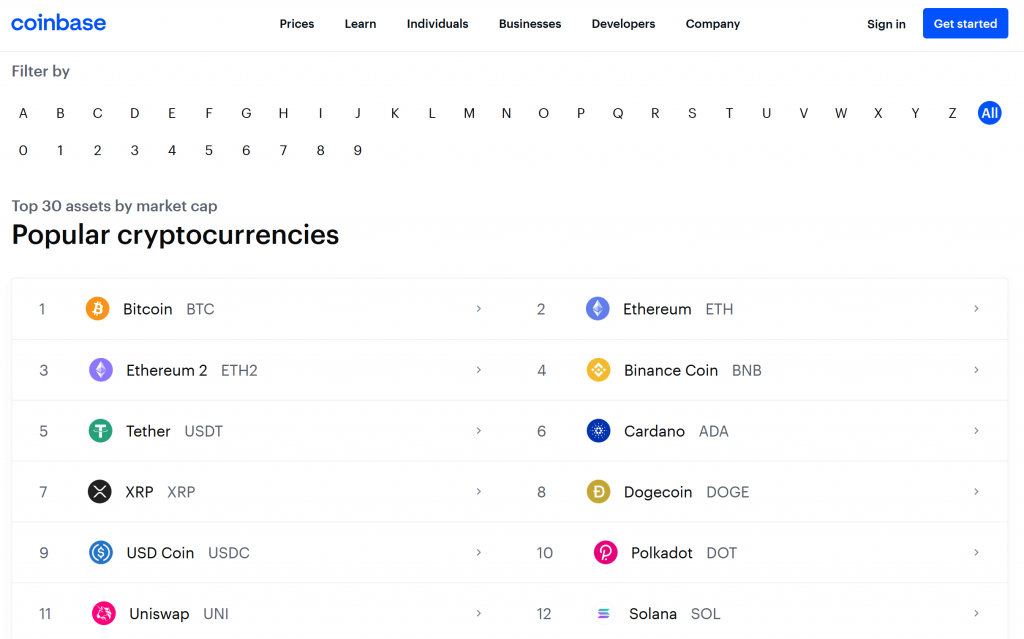
Available coins: As of writing, Coinbase supports around 62 coins, including Bitcoin, Bitcoin Cash, Ethereum, Litecoin, Tezos, Ripple and more.[5]
Available contracts: Similarly, the contracts on Coinbase are spots, meaning users can buy, hold and sell the supported cryptocurrencies.[5]
Voyager fees vs Coinbase
Voyager
Voyager prides itself with its “100% Commission-Free” trades. One of their main profit models is centered around their dynamic smart order routing system that takes advantage of price disparities between different markets; when this happens, the user saves money, and Voyager takes a fraction from that saved amount as profit.[2]
That being said, blockchain fees may still occur.
Coinbase
The trading fees on Coinbase are as follows[6]:
0.50% spread for cryptocurrency purchases and sales, as well as flat fees that can range from $0.99 to $2.99 depending on the transaction amount. Up to 2% spread margins for crypto conversions, and 25% commissions on staking
These fees may vary by region, and may be subject to terms and conditions.
Deposits & withdrawals
Voyager
Deposits: Fiat deposits are made via bank transfer (ACH), at a minimum of $10, a maximum of $5,000 a day, and an instant deposit option of up to $10,000[7]. Alternatively, users can deposit using wire, in which case a $50 fee incurs[8]. For crypto deposits, users can currently deposit only 11 coins and tokens including BTC, ETH and VGX[2].
Withdrawals: Fiat withdrawals are limited to $25,000 a day, and withdrawals themselves are limited to 20 per day[9]. Wire withdrawals are an option, but have a minimum required amount of $10,000, with a $50 transfer fee[8]. Users can withdraw the same 11 coins and tokens that they can deposit[2], up to $25,000 in market value per day[10], with flat fees that differ from crypto to crypto[11].
Coinbase
Deposits: There are no deposit limits for crypto or fiat, and while Coinbase does not charge any fees on incoming crypto, there are certain fees for fiat deposits that are based on location and payment methods, details for which can be found here.
Withdrawals: There are minor minimum withdrawal limits, but no maximum ones. There is a 1% conversion fee if the crypto is being withdrawn in fiat, and standard transaction fees for crypto withdrawals which depend on the blockchain fees.[12]
Security and Trustworthiness
Voyager
Voyager is a public company, meaning they are publicly traded, licensed and regulated. With honesty and transparency being their top priorities, they are audited to ensure all of their assets are accounted for within their systems.[13]
Not very specific with their security measures, Voyager mentions cutting-edge technology that prevents hackers and frauds[13]. They use a combination of hot and cold storages for crypto assets, which is more or less the same system that most exchanges use[1]. User data is encrypted using state of the art features, and are stored securely with minimal access[14].
And as is expected from exchanges, Voyager uses 2-factor authentication for important actions such as logging in and withdrawals[15].
Coinbase

Being one of the biggest exchanges in the world, Coinbase has to have high levels of security and trustworthiness to maintain its position, and in those regards, it does quite alright. It is transparent about its fees, and since Coinbase is a beginner-friendly platform, there isn’t a lot to pay attention to.
98% of customer funds are stored offline, as well as sensitive data which are encrypted and backed up, and stored in vaults around the world. The website runs entirely over encrypted SSL, and uses SQL injection filters to prevent CSRF attacks. Employees of Coinbase have to pass background checks and are required to encrypt their hard drives, utilize strong passwords and enable screen locking to prevent any potential damage.[16]
All accounts require strong passwords which are also encrypted, and are protected with 2-factor authentication. Certain actions of serious significance are limited and monitored to spot and prevent suspicious activities.[16]
Insurance funds
Voyager
All funds are held by their banking partner and are FDIC ensured at $250,000 per individual[13].
Coinbase
Likewise, customer funds are FDIC ensured at $250,000 per individual[17].
KYC conditions
Voyager
Voyager requires KYC documents to allow users to trade, and those requirements are[18]:
- Email address
- Full name
- Mobile phone number
- Home address
- Date of birth
- Social security number
It should be noted that on certain occasions, users may be asked for additional documents which may include but are not limited to[18]:
- A selfie with an ID document such as a government-issued ID card, passport or valid driver’s license
- Proof of social security number
- Proof of home address
Coinbase
Coinbase also requires users verify their accounts with KYC, and they’ll request the following[19]:
- Name
- Date of birth
- Physical address
- Social security number or ID number
- Source of funds
- Income/employment information (US only)
- Explanation of activity (US only)
- Identification document such as ID card, passport or driver’s license (US only)
- Live selfie (US only)
These requirements can be subject to change, and residents outside the US may be asked for different documents.
Available in the US?
Voyager
Yes, Voyager is available in all US states except New York, which is in the process of happening. In fact, Voyager is currently only available in the US, but is planning on expanding internationally later this year.[13]
Coinbase
Coinbase is available in the US as well as in dozens of countries around the world[20].
Special features
Voyager
Voyager is perhaps best known for its low fees; comparing different exchanges to offer users the best prices, paired with 0% commission fees result in a very desirable platform for those who care about minimizing costs.
Coinbase
One of Coinbase’s most beloved features is the Earn Crypto section where users can earn free crypto just by learning about various cryptocurrencies. At the time of writing for example, users can earn a total of $25 in various coins and tokens.
Native token availability and benefits
Voyager

The Voyager Token (VGX) is the native token of Voyager and it currently only offers a 3% APY (annual percentage yield) when held in the Voyager app. Certain exclusive features are planned for the future such as cash back rewards, but as it stands currently it has minimal benefits.[21]
VGX can be directly bought through the app.
Coinbase
Coinbase currently does not have any native tokens.
Customer support and education
Voyager
As far as education goes, Voyager has the Node Blog where it mostly covers on topics and updates surrounding the platform, but also on important news and events in the crypto world.
The Voyager FAQ page contains a variety of articles that answer frequently asked questions. Here, users can search through these pages to find the answers they are looking for.
If all else fails however, they can always contact customer support here. It is worth noting that as of late, user reviews on both the IOS and Android apps have expressed disappointment in customer support response times, with some users stating they never got a response.
Coinbase
Coinbase Learn is an educational platform that features beginner guides on everything crypto related, covering topics from the basics to recent events and trends. These articles are very resourceful for newcomers who wish to learn more about cryptocurrency.
Users who require assistance can visit the Coinbase Help Centre to troubleshoot their issues, and for personal assistance, can contact them directly here. Coinbase do not answer immediately however, especially during times of market volatility.
In case you want to check out other exchanges, below is our list of comparisons:

